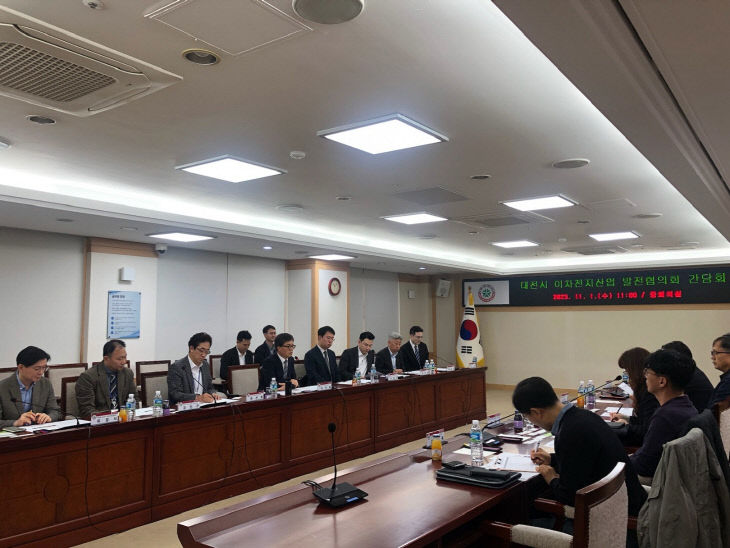Daejeon secondary Battery Industry Development Council Launched on the 1st
7 companies including local companies such as LG Ensol and SK on participate
Three universities, Chungnam National University, KAIST, and Hanbad University, also participate in talent development

The first meeting after the launching ceremony of the Daejeon City Secondary Battery Industry Development Council held on the 1st.
[Photo courtesy of Daejeon City]
Daejeon City forms a council with seven companies and three local universities to foster the secondary battery industry and create infrastructure.
Daejeon City launched the ‘Daejeon Secondary Battery Industry Development Council’ on the 1st and held the first meeting.
The council was formed to create a place for communication between industry, academia, research, and government related to the secondary battery industry, share relevant information, and listen to pain points. It is also reported that they shared opinions on creating an ecosystem base for win-win cooperation leading to commercialization along with technology exchange.
The meeting was attended by officials from Daejeon City, including Lee Seok-bong, Vice Mayor of Economic Science, and Han Sun-hee, Head of Strategic Business Promotion, as well as domestic battery giants LG Energy Solutions and SK energy.
Five local companies, Nano Team, LiBEST, Mintech, H2, and Cognitive Solutions, were represented, along with 16 people from the Korea Chemical Research Institute, government-funded researchers, and Daejeon Technopark officials. The three local universities were Chungnam National University, Korea Advanced Institute of Science and Technology (KAIST), and Hanbad University.
In the future, Daejeon plans to foster the secondary battery industry, which has great potential for market development due to eco-friendly policies and digital transformation, as a new future food industry that can grow together with Daejeon’s four strategic industries, Aerospace, Biohealth, Nanosemiconductor (Chip), and Defense.
In this regard, the meeting also presented three promotion strategies and five key points to foster the secondary battery industry.
The main content is to support the technology and development of next-generation batteries by securing ultra-gap technologies and key personnel, and to foster local representative companies with current capabilities as anchor companies through close and comprehensive support. In addition, it plans to create a regional ecosystem foundation for the sustainable growth of the secondary battery industry in the future.
The city plans to develop support policies and secure budgets for research and development (R&D) support and infrastructure facilities to secure ultra-gap technological competitiveness based on the technological capabilities possessed by Daejeon, such as Daedeok Special Zone.
The council decided to establish a specialized collaborative system to prepare policies to foster the secondary battery industry and companies in Daejeon by holding various types of working meetings such as technology exchanges, forums, and conferences.
Lee Seok-bong, Deputy Mayor for Economic Science, Daejeon City, said, “Daejeon City, which has technological competitiveness centered on Daedeok Special Zone, is the best place to foster the secondary battery industry, a new future food industry.” “We hope that the launch of the council will serve as a catalyst for the creation of the secondary battery industry ecosystem in Daejeon City, and we will do our best to prepare practical support policies.”
[Source:https://www.joongdo.co.kr/web/view.php?key=20231101010000340]



